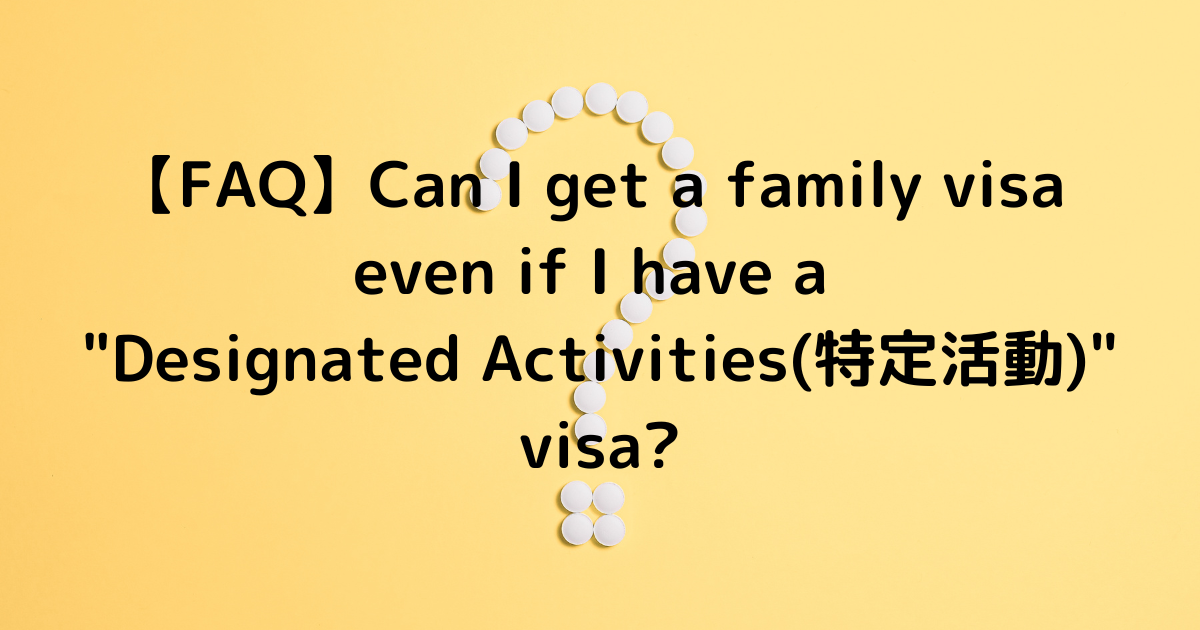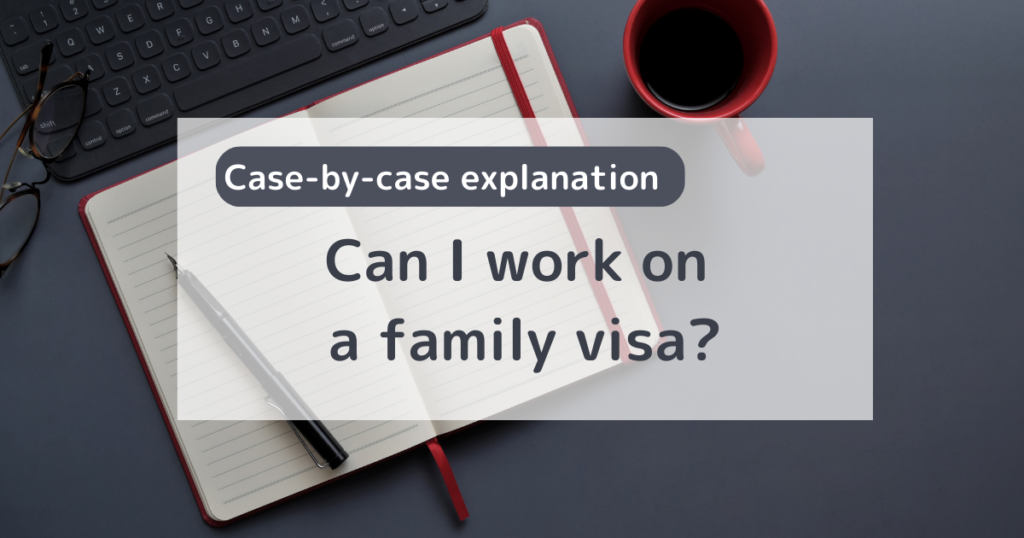
For those who are staying in Japan with their families under a status of residence (visa) such as “Spouse or Child of Japanese National(日本人の配偶者等)”, “Spouse or Child of Permanent Resident(永住者の配偶者等)”, “Long Term Resident(定住者)”, or ” Dependent(家族滞在)”, there are those who can work (income-producing activities) without going through procedures and those who are not allowed to work without going through procedures.
In this part, we will explain whether you can work with the status of residence (visa) you have and the conditions for such work.
Family visas and working

“Status of residence” indicates the extent to which a foreigner may legally land, stay, and engage in activities in Japan. As of October 2023, there are 29 different statuses of residence. Resident statuses are often referred to as “visas”.
Resident status is assigned according to activity and status (spouse, child, etc.). This means that all foreigners staying in Japan have some kind of status of residence.
Status of residence in Japan can be divided into three categories: “status of residence that permits work” (so-called “work visa”), “status of residence that does not permit work”, and “status of residence based on status or position (no restriction on activities)”.
In terms of family visas, “status of residence based on status (no restrictions on activities)” applies to “Spouse or Child of Japanese National”, “Spouse or Child of Permanent Resident”, “Long Term Resident”, and “Permanent Resident”, while “status of residence where work is not permitted” applies to ” Dependent” and some people with “Designated Activities(特定活動)” living with their family who are working under a work visa.
You can find out if you can work by looking at your residence card.
【Residence card with no work restrictions】
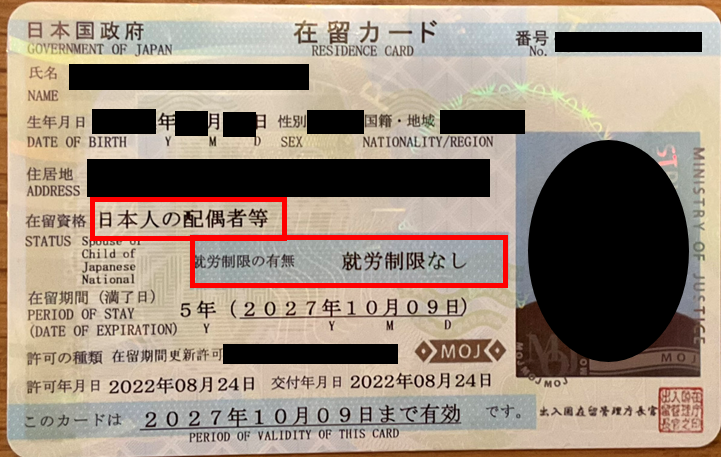
It says, “No work restrictions” in the column for whether or not there are any work restrictions. In this case, you are free to work.
【Residence card with work restrictions】
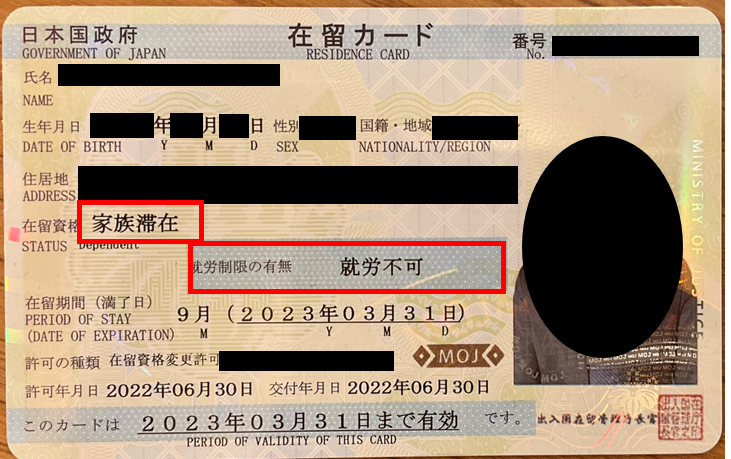
It says, “No work allowed” in the column for whether or not there are any work restrictions. In this case, work is not allowed.
※If you obtain a “Permission to engage in activities other than those permitted under the status of residence(資格外活動許可)”, which will be explained later, you will be able to work.
Status-based residence

The “Spouse or Child of Japanese National”, “Spouse or Child of Permanent Resident”, “Long Term Resident”, and “Permanent Resident” are statuses granted based on your status (e.g., married to a Japanese national) and are called “status-based statuses”.
Spouse or Child of Japanese National
A status of residence such as “Spouse or Child of Japanese National” is a “status of residence based on status” and there are no restrictions on activities. The requirement to stay in Japan is the status of being married to a Japanese partner, so there is no problem whether you work full time for a company, run a company, or freelance. There is also no problem if you are unemployed. This kind of status is called “no activity restrictions”.
As for those who have status-based residence, as long as they can maintain their status of residence, they can work without restrictions in the same way as Japanese nationals.
Spouse or Child of Permanent Resident
Spouse or Child of Permanent Resident is the same as Spouse or Child of Japanese National, “Status of Residence Based on Status”, and there are no restrictions on activities. The explanation is the same as for a Spouse or Child of Japanese National.
Long Term Resident
Long Term Residents, like “Spouse or Child of Japanese National”, are granted “status of residence based on status” and there are no restrictions on their activities. The explanation is the same as for a Spouse or Child of Japanese National.
Dependent

As you can see on the front page of the residence card, the status of residence “Dependent” is “Not Permitted to Work”. By obtaining a Permission to engage in activities other than those permitted under the status of residence, it is possible to work, although there are certain restrictions.
Dependent is assumed to be supported by the family.
The status of residence “Dependent” is a status of residence (visa) that is granted when the following conditions are met.
・Receiving support from a partner (spouse) working on a work visa
・Partner (spouse) working on a work visa must have the ability to support
As can be seen from the above, the partner who works on a work visa is solely the breadwinner of the family, while the person staying on a Dependent visa is in the position of being a dependent. Since this is the basic premise, you can work by obtaining “Permission to engage in activities other than those permitted under the status of residence”, which will be explained next, but you will not be able to do work for many hours.
You can work by obtaining a “Permission to engage in activities other than those permitted under the status of residence”
There are two main types of “Permission to engage in activities other than permitted under the status of residence”: one called “blanket permission(包括許可)” and the other called “individual permission(個別許可)”. When “Dependent” or “Students” work part-time, they often obtain a “Blanket permission”, which may be more familiar to you. In addition, since the “Individual permission” is a difficult topic, this part will explain only the ” Blanket permission”.
This “blanket permit” allows for activities that involve operating a business with income or receiving remuneration for up to 28 hours per week. The “blanket permit” is limited to work that can be controlled by a time card, etc., because of the “up to 28 hours per week” rule.
With this “blanket permit”, except for industries regulated by Act on Control and Improvement of Amusement Business(風営法), it is possible to work as a so-called blue-collar worker, such as serving customers at convenience stores and restaurants, or sorting goods at warehouses and the like. In other words, you can work part-time with relative freedom.
Incidentally, “Permission to engage in activities other than those permitted under the status of residence” is a procedure to be applied for at the Immigration Service Agency, and if you receive the permission, you will receive a stamp on the back of your residence card.
【Column for Permission to engage in activities other than those permitted under the status of residence.】
Once you obtain a blanket permit, the following will be written at the bottom of the back of your residence card.
Permit (in principle, up to 28 hours per week, except for engaging in the amusement business, etc.).”
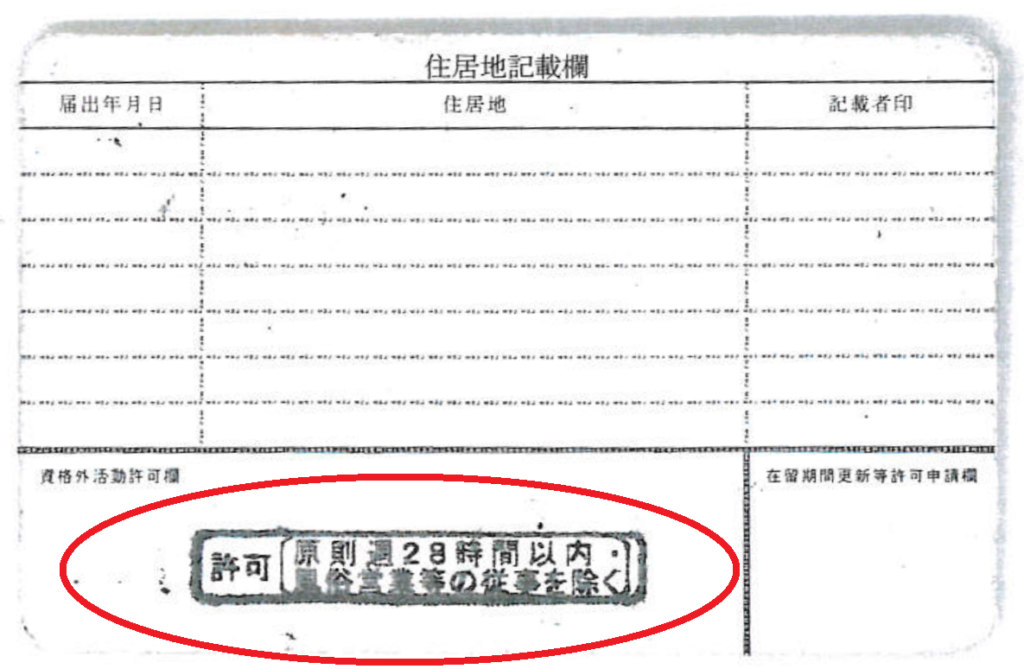
▶Reference:Immigration Service Agency「Permission to engage in activities other than those permitted under the status of residence」
Points to keep in mind when working with “Permission to engage in activities other than those permitted under the status of residence”
When working with a Permission to engage in activities under the status of residence, one must be careful about “working hours” and “earning too much”.
With a blanket permission to engage in activities other than those permitted under the status of residence, you may work up to 28 hours per week, but the “28 hours per week” must always be no more than 28 hours per week, no matter what day of the week is counted from. This is not an average throughout the month, nor is it calculated by “annual salary divided by hourly wage divided by 12 (months) divided by 4.3 (weeks). It must be “28 hours per week, no matter which seven consecutive days are cut off”.
In addition, if you are not able to perform well the activities permitted by the status of residence you currently have, even if you work less than 28 hours per week, you may be judged to be “working too much” and your residence may be affected. What you need to pay attention to is when a person residing in Japan on a “Dependent” visa works beyond the scope of his/her partner’s support. Having more income than a partner working on a work visa is not evaluated as “receiving support”, and in some cases, depending on the Immigration Service Agency, an annual income in excess of 1.3 million yen may be disallowed as exceeding the scope of support.
Designated Activities

“Designated Activities” who stay as a family member of a partner working on a work visa may be a “Designated Activities (No. 33,Working Spouse of a Highly Skilled Professional foreigner)(特定活動(33号・高度専門職外国人の就労する配偶者))” who can work full time or a “Designated Activities” with the same content as “Dependent”.
Designated Activities (No. 33, Working Spouse of a Highly Skilled Professional foreigner)
In the case of a spouse of a “Highly Skilled Professional”, in addition to the “Dependent” status, which is restricted to working, the spouse may also apply for “Designated Activities (No. 33, Working Spouse of a Highly Skilled Professional)” which allows full-time work if the spouse’s place of employment is fixed at the time of application and the work falls under the status of residence “Researcher(研究)”, ” Instructor(教育)”, “Engineer/Specialist in Humanities/International Services(技術・人文知識・国際業務)”, or “Entertainer(興行)“. This status of residence does not allow an unlimited choice of jobs, but it does allow full-time employment without a limit of 28 hours per week. It is also not required to be within the scope of support, as is the case with the “Dependent” status.
To obtain the status of residence of “Researcher”, “Instructor”, “Engineer/Specialist in Humanities/International Services”, or “Entertainer”, there are requirements for academic and professional background, etc. However, there are no academic or professional background requirements when applying for “Designated Activities (No. 33, Working Spouse of a Highly Skilled Professional)”. You must earn remuneration equal to or greater than that of a Japanese national and live together with your spouse (Highly Skilled Professional).
(2) Activities to provide language education and other education at elementary schools, junior high schools, high schools, secondary schools, special-needs schools, vocational schools, or other educational institutions equivalent in terms of facilities and organization in Japan
(3) Activities to engage in work that requires skills or knowledge in the natural sciences or humanities, or work that requires thinking or sensitivity based on foreign culture (excluding activities listed in the Research, Education, and Entertainment sections of the table in Appended Table 1-2 of the Immigration Control Act)
(4) Performing arts activities other than those pertaining to entertainment, which fall under any of the following
(a) Activities pertaining to the promotion of goods or business
(b) Activities pertaining to the production of broadcast programs (including cable broadcast programs) or movies
(c) Activities pertaining to the taking of photographs for commercial use
(d) Activities to make sound or video recordings on records, videotapes or other recording media for commercial use
If you wish to work under this status of residence, you must have a place of employment decided in advance.
Designated activities (other than No. 33)
If the status of residence of the partner working on a work visa is “Designated Activities” and family members are allowed to accompany the partner, they are also “Designated Activities”. Specifically, spouse of ” Designated Activities (No. 6, amateur athletes(アマチュアスポーツ選手))”, “Designated Activities (No. 36, specified research and other activities(特定研究等活動))”, “Designated Activities (No. 37, specified information processing activities(特定情報処理活動))”,
“Designated Activities (No. 16, 17, 19, 20, 21, 22, 27, 28, 29)”, “Designated Activities (No. 44, foreign entrepreneur(外国人起業家))”, “Designated Activities (No. 46, graduate of a Japanese university(本邦の大学卒業者))”, and “Specially Skilled Worker 1(特定技能1号) (*conditions apply)”.
In the case of these statuses, as with “Dependent”, by obtaining a Permission to engage in activities other than those permitted under the status of residence (blanket permission), the applicant may work up to 28 hours per week within the scope of his/her partner’s support.
Conclusion

The above is an explanation of whether or not a person living under a status of residence (visa) such as “Spouse or Child of Japanese National”, “Spouse or Child of Permanent Resident”, “Long Term Resident”, or “Dependent” can work.
Those with status of residence such as “Spouse or Child of Japanese National” have no restrictions on their activities, so they are free to choose a job and work just like Japanese nationals.
Dependents are not allowed to work. However, by obtaining a Permission to engage in activities other than those permitted under the status of residence, they can work within the scope of their partner’s support and to the extent permitted.

![[Visa Application] Status of Residence for Spouses, Children, and Parents of Highly Skilled Professionals(高度専門職)](https://kekkonvisa-nextstep.com/wp-content/uploads/koudo_family_en.png)
